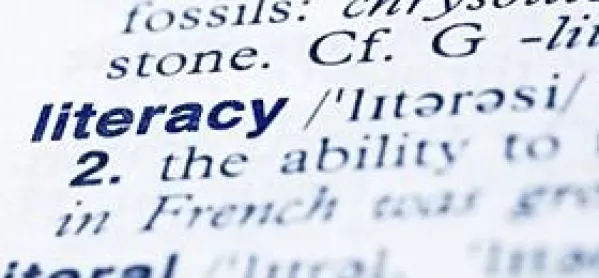Welsh literacy levels still ‘shocking’

Critical reports and judgements on the state of Wales’s education system have been delivered so frequently in recent years that it is often hard to keep track. But every January the sector sits up and takes particular notice of the verdict of Estyn’s chief inspector, whose annual report is seen as the most reliable diagnosis of the nation’s educational health.
This week, Estyn chief inspector Ann Keane insisted that her latest report, released on Tuesday, is the clearest narrative yet of the areas of weakness in schools and what needs to improve.
Anyone familiar with Wales’s educational ills could be forgiven for feeling a sense of deja vu, as the same problems that have blighted the sector for years are highlighted again, specifically poor literacy and numeracy levels, uneven teaching quality, a failure of leadership and a lack of support from local authorities.
Literacy and numeracy skills remain a particular concern - inspectors found underperformance at every key stage among a “significant minority” of pupils. Ms Keane said it was “unacceptable” that 40 per cent of pupils enter secondary schools with a reading age of more than six months below their actual age. Professor David Reynolds, a senior policy adviser to the Welsh government, said the figure was “shocking”.
The annual report says that in-school variation in standards and problems with uneven teaching quality are common features in most schools, and even where a school is judged good overall, individual lessons or departments are often of poor quality.
The concerns echo criticisms made by former Ofsted chief inspector Christine Gilbert, who last year said that too many schools in England were judged to be outstanding overall even if they did not excel in teaching.
Estyn inspectors also found a “significant drop” in the proportion of excellent or outstanding teaching, compared with the last inspection cycle. Ms Keane said this was partly due to a change of focus under the new inspection framework, launched in September 2010, but added: “It is also about failures in self- evaluation and performance management and a failure to share best practice. If all schools were doing those three things properly we wouldn’t have such variation.”
Of course, this is nothing new. The School Effectiveness Framework policy, first published four years ago, was designed to tackle these very issues, but critics claim it has lost its way.
The report also attacks failures of school leadership, saying that in about a quarter of schools headteachers and governors don’t monitor performance carefully enough or challenge how well teachers and pupils are performing.
Ms Keane urged leaders and managers to address underperformance more “robustly and directly”, including that of individual teachers. She pointed the finger of blame at town halls, saying some simply did not know their schools well enough - a criticism that has been made repeatedly in recent years. “In many local authorities, a few schools have been allowed to underperform over a long period of time, mainly because authorities do not use the full range of their powers to improve schools quickly enough,” she said.
In fact, Estyn has yet to find an outstanding council in Wales. Of the seven local authorities inspected in 2010-11, only two were rated good. The other five needed follow-up visits because three were judged to be adequate, one was in need of significant improvement and one, Blaenau Gwent, was put in special measures.
Ms Keane’s report did contain positives: it found that standards of well- being are high and the foundation phase is having a positive effect. But it will be remembered for the negatives.
Professor Reynolds called the report “insightful”. He said: “I think the chief inspector is saying not much has changed, the picture is the same. That is a concern, but the acid test will be whether things are starting to change in this academic year.”
Teaching union ATL Cymru said the report was a “withering indictment” on the role of local government, which it described as the “weak link” in the education system.
Heads’ union NAHT Cymru said there was agreement about what needs to be done and the debate should be moved on: “It seems that making the diagnosis is attracting far more energy than making sure the remedies are developed properly.”
A spokesman for education minister Leighton Andrews said the report made clear that standards and performance in Wales need to improve across the board.
”(The) annual report identifies where we have been successful and where the education sector in Wales needs to raise its game,” the spokesman added. “We are strong believers that accountability is at the heart of improvement - it’s certainly our message to the sector.”
Small change For the first time, Estyn has a national picture of learners’ views of their education, based on responses from 16,500 primary pupils and 7,000 secondary pupils. 95% of pupils feel safe in school and believe they are doing well. 95% of primary pupils know who to talk to if they are worried or upset. A third of secondary and a quarter of primary pupils have concerns about the behaviour of other pupils. Parents also answered questionnaires for the first time: 95% of parents are satisfied with their child’s school, think teaching is good and believe their child is making good progress. 15% of parents are concerned about behaviour at their child’s secondary school. Original headline: Welsh literacy and numeracy levels still prove `shocking’
Keep reading for just £1 per month
You've reached your limit of free articles this month. Subscribe for £1 per month for three months and get:
- Unlimited access to all Tes magazine content
- Exclusive subscriber-only stories
- Award-winning email newsletters



